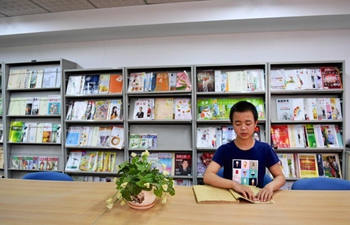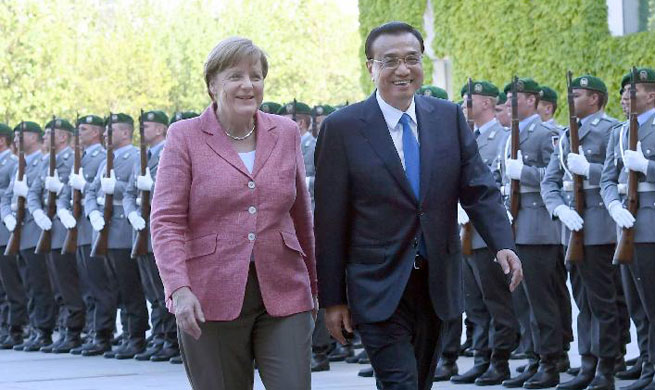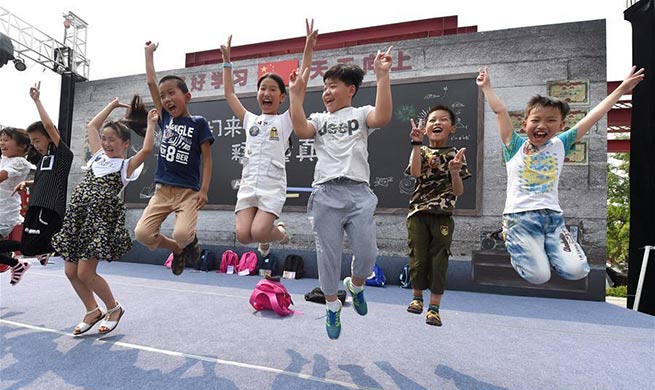BEIJING, June 1 (Xinhua) -- Huang Xiaoru is happy. She won a painting award in a competition and went to several events organized by her primary school prior to International Children's Day.
The eight-year-old and her younger brother study in Wanxiu Primary School, Nanning, capital of southern China's Guangxi Zhuang Autonomous Region. Their parents, from a rural county run by Nanning, have been working in the city for years.
Two-thirds of the 1,703 students in the school are children of migrant workers.
"Our class has 54 pupils, 44 of whom are children like Huang," said Chen Jinling, head teacher of Huang's class.
"As most of their parents are busy, the school held a number of events for them ahead of Children's Day," Chen said.
Instead of leaving children behind in their home villages, to be cared for by aging grandparents, more Chinese migrant workers are taking them to cities to provide better care and education for them.
China has around 14 million children who live with migrant parents in cities and 9 million "left-behind children," that stay back in rural areas.
Children's education is a major concern of migrant laborers, who have made significant contribution to the country's rapid urbanization.
In recent years, the Chinese government has urged local public schools to simplify qualification requirements and recruit as many children of migrant workers as they can to ensure their compulsory education -- primary and junior middle schooling.
Most Chinese parents prefer public schools as they are of good quality and low cost. However, due to their capacities, public schools in cities cannot absorb all the children of migrant workers.
"Ten years ago when we brought our eldest daughter here, she could not enter a public school as we only had a rural hukou [a basic household registration]," said Tang Haiyan, a female migrant worker in Nanning.
Things are much easier now. Tang's second daughter studies in a public primary school in the city.
"Parents who have the right documents for a hukou, residency and work are able to enroll their children," said Lei Youheng, headmaster of a Nanning primary school.
In Nanning, the number of children of migrant workers studying in public schools has increased from 113,000 in 2012 to 136,000 in 2016, accounting for 53 percent and 62 percent of total local migrant children, respectively. The remaining children of migrant workers have to attend private schools.
The schooling of such children varies from province to province. In the northern province of Hebei, the government says 90 percent of children of migrant workers are enrolled in public schools.
A rural education report released by Northeast Normal University in Jilin Province in December, showed the country's children of migrant workers in cities reached 13.7 million in 2015, up 8.4 percent from 2011. About 84 percent studied in public schools.
The central budget has allocated an urban-rural compulsory education fund of 117 billion yuan (17.2 billion U.S. dollars), up 6.4 percent from 2016, said the Ministry of Finance in early May.
The fund will also benefit millions of children of migrant workers in cities. They will enjoy free textbooks and exemption of school fees. Living subsidies will be offered to boarding students whose families have financial difficulties.
Local governments have unveiled similar policies to guarantee compulsory education for children of migrant workers.
In April, the Education Department of Henan Province released a document to ensure equality for children of migrant workers in compulsory education, urging efforts to simplify enrollment procedures.
GAPS AND CHALLENGES
However, many gaps remain.
For megacities under pressure to control population growth, local governments push policies based on scores linked to parents' jobs, educational background and property, etc., according to Qin Hongyu, a researcher with 21st Century Education Research Institute, a non-profit organization on public educational policy.
"The score indices are favorable for advantaged groups but unfair to rural migrant workers' children in getting equal education," he said.
"The local government does not provide sufficient education services compatible with the demands of the permanent population. If the supply is not increased, newcomers and grassroots locals have to compete for education resources. This is a real problem," said Zhang Mei, a university researcher who has lived in Beijing for nearly 20 years.
The couple have no local hukou in Beijing and try their best to get their daughter enrolled in a public primary school.
The academic records of the children of migrant workers are another problem. As migrant workers are busy working, they have little time to take care of their children or guide their learning.
Tan Ping, 16, is not interested in continuing classes at a public junior middle school in Beijing. He wants to drop out and find a job to support the family.
His father and mother are migrant workers from Shandong and Anhui provinces, respectively. The mother suffers a serious kidney illness. Tan has two younger brothers who study in a private school, relying on social aid. The five-member family live in a two-room brick house in the capital.
Tan said he planned to find a job to relieve pressure on his family.
Like Tan, many children of migrant workers lack a comfortable environment to continue learning after school, usually living with their parents and siblings in shabby, crowded houses, a factor leading to poor academic results.
The education quality of many private schools, which have difficulty recruiting good staff, cannot match public schools.
A university survey tracking 1,866 students in 50 junior middle schools for migrant workers' children in Beijing found only 39 percent of students continued their education in senior middle schools and only 6 percent entered university.
A sense of isolation is another challenge. The circles of friends of these children are often other migrant workers.
"Policy barriers can be removed overnight, but psychological gaps will take two to three generations to overcome," said Li Tao, founder of Facilitator, a Beijing-based organization devoted to improving the lives of migrant workers and their children.

















